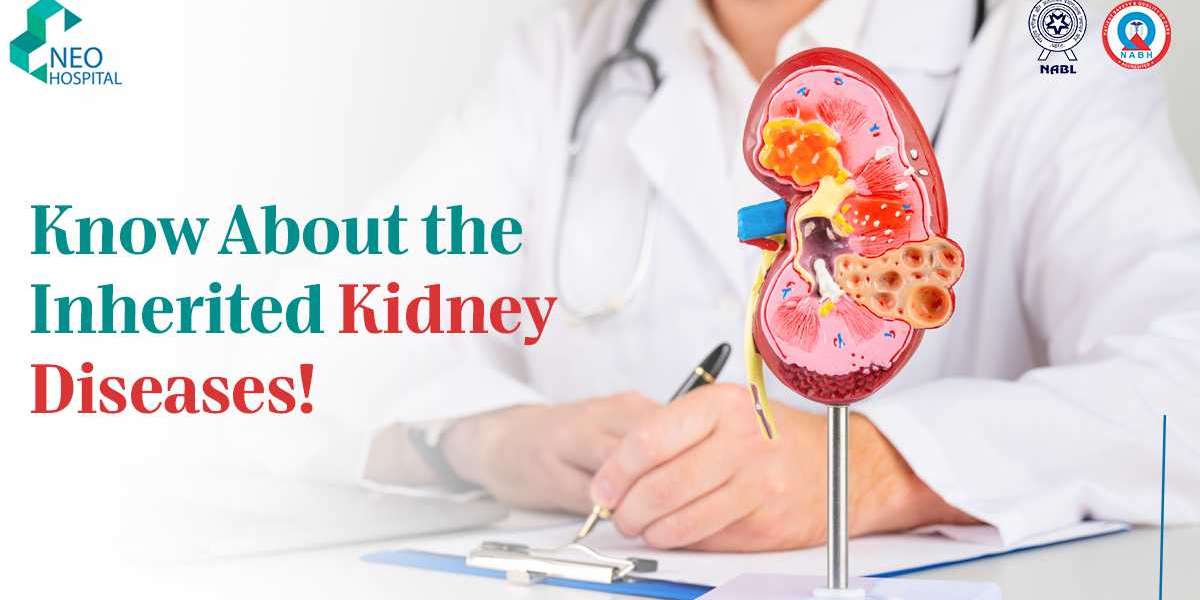Kidneys are vital organs that play a crucial role in maintaining the body's overall health. Unfortunately, some individuals are born with or inherit kidney diseases, which can have a significant impact on their lives. In such cases, consulting a nephrologist in Noida, especially the best nephrologist in Noida, affiliated with NEO Hospital, is crucial. In this blog, we will explore inherited kidney diseases, their causes, symptoms, and the importance of seeking expert medical care.
What Are Inherited Kidney Diseases?
Inherited kidney diseases, also known as genetic kidney diseases, are conditions that are passed down through families due to genetic mutations. These mutations can affect the structure and function of the kidneys, potentially leading to a wide range of kidney-related problems. These conditions can be present at birth or become apparent later in life.
Common Types of Inherited Kidney Diseases
1. Polycystic Kidney Disease (PKD): PKD is one of the most prevalent inherited kidney diseases. It causes fluid-filled cysts to form in the kidneys, leading to an increase in kidney size and a decline in function over time. Autosomal Dominant Polycystic Kidney Disease (ADPKD) and Autosomal Recessive Polycystic Kidney Disease (ARPKD) are the two primary forms of PKD.
2. Alport Syndrome: Alport syndrome is a genetic disorder that affects the basement membrane of the kidneys, leading to hematuria (blood in the urine), hearing loss, and eye abnormalities. It can lead to chronic kidney disease and eventually kidney failure.
3. Fabry Disease: Fabry disease is a rare genetic disorder that affects the metabolism of lipids. It can lead to kidney damage, along with other systemic symptoms such as skin rashes, pain, and gastrointestinal issues.
4. Nephronophthisis: Nephronophthisis is a group of inherited kidney diseases that primarily affect children and young adults. It leads to the gradual loss of kidney function, ultimately resulting in kidney failure.
Symptoms and Diagnosis
The symptoms of inherited kidney diseases can vary depending on the specific condition and its stage. Common signs to watch out for include:
● Blood in the urine (hematuria)
● High blood pressure
● Frequent urinary tract infections
● Swelling in the face, hands, or feet
● Back or side pain
● Decreased kidney function
To diagnose inherited kidney diseases, genetic testing is often necessary. A nephrologist will review the patient's medical history, perform a physical examination, and order specific tests such as blood and urine analysis, imaging studies, and, in some cases, genetic testing.
The Role of a Nephrologist
When dealing with inherited kidney diseases, it is essential to consult a nephrologist, a specialised medical professional with expertise in diagnosing and treating kidney conditions. In Noida, NEO Hospital provides access to some of the best nephrologists who can offer comprehensive care for patients with inherited kidney diseases.
Treatment and Management
The management of inherited kidney diseases often focuses on slowing the progression of the condition, managing symptoms, and preventing complications. Specific treatment strategies may include:
1. Blood pressure control: Maintaining blood pressure within a healthy range is crucial to protect the kidneys.
2. Medications: Certain medications may be prescribed to manage symptoms, such as pain, and high blood pressure, or to delay the progression of kidney disease.
3. Dialysis or transplantation: In severe cases of kidney failure, dialysis or kidney transplantation may be necessary.
Conclusion
Inherited kidney diseases can be challenging, but with the guidance of the best nephrologist in Noida, affiliated with NEO Hospital, patients can receive the specialised care they need. Early diagnosis, proper management, and a support system are essential to living a fulfilling life despite these conditions. If you suspect you or a loved one may have an inherited kidney disease, seek medical attention promptly to receive a personalised treatment plan. Remember, knowledge and timely intervention can make a significant difference in the outcome.
Read Also…








